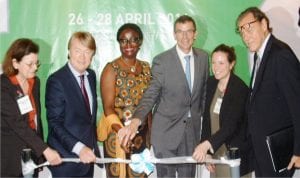Business
Contribution Of Solid Minerals To GDP Too Low – Minister

L-R: Project Manager, Food Processing and Packing Machinery, Ms Martina Claus, Managing Director of Fairtrade, Mr Martin Marz, Technical Adviser (Youth and Gender) to the Minister of Agriculture and Rural Development, Mrs Mosumola Umar, Consular General, Embassy of France, Lagos, Mr Laurent Polonceaux, Project Manager, Subsaharan Africa Livestock and Genetics, Aude Roelly, and Economic Councillor, French Embassy, Francis Widmer, at the opening of Exhibition and Conference on Agrofood and Plastprintpack Nigeria in Lagos, yesterday.
Minister of Solid Mineral Development, Dr Kayode Fayemi, yesterday has said that the contribution of solid minerals to Gross Domestic Product (GDP) is low.
Declaring open a seminar on “The Role of Mining Sector in Diversifying the Revenue Base of the Nigerian Economy,” Fayemi described the situation as unacceptable.
The minister noted that in spite of the recognisable size of solid minerals in every local government in Nigeria, its contribution to GDP was too low.
The one day seminar was organised by the non-oil monitoring committee of the Revenue Mobilisation, Allocation and Fiscal Commission (RMAFC).
Fayemi, who was represented by the Minister of State, Mr Abubakar Bwari, said the contribution of the sector to GDP was as low as 0.34 per cent.
He said Nigeria had enough resources to make it one of the richest countries in the world but was rated among countries with the highest number of poor people.
Fayemi said that the present administration was determined to change that by ensuring that the solid minerals sector rivals the oil sector.
“In order to do that however, we must formalise the activities of our artisanal miners, repair moribund infrastructure and provide more respectable geosciences data.”
He said there was the need to also engage with foreign and domestic partners and work off an integrated roadmap that would emerge from a broad consultation process.
Fayemi also said that the Federal Government was focusing attention on agriculture because Nigeria was spending more than N1.5 trillion annually to import food, a situation that has put a heavy pressure on the nation’s foreign exchange.
He commended the RMAFC for showing great concern for wealth generation as part of its constitutional responsibility of monitoring revenue accruals into the Federation Account.
He said that its recommendation to upgrade the mines and inspectorate department of the Ministry into an agency was being adopted.
The department is responsible for exploitation and exploration activities as well as collection of operational fees.
Acting Chairman of the commission, Mr Shettima Abba-Gana, in an address said that the commission’s efforts geared towards generating revenue from the sector enabled it to contribute N12 billion into the federation account in 2015.
From this, he said 13 per cent derivation was paid to the states where the solid minerals were gotten from for the first time.
He, however, said that the key problems bedevilling the sector were “dominance of the mining sector by foreign companies, especially the Chinese companies and illegal mining activities by artisanal and small miners all over the country, resulting in environmental devastation and loss of revenue to government.”
Mr Ajibola Fagboyegun, a federal commissioner at the RMAFC told newsmen that the factors hindering mining exploration were being looked into.
“A situation where an individual will have title license covering very large area of land but will not be seen and the prospective investors will find it difficult to come in and work is now being redressed.
“Soon the atmosphere will be conducive for mining business with friendly policy that will encourage investors to come in.
“We are sure many people want to make money and Nigeria is a very good environment for investors to make their money,” he said.
The seminar was geared towards developing new initiatives on how to diversify the economy from crude oil to solid minerals to boost revenue.
Business
PENGASSAN Tasks Multinationals On Workers’ Salary Increase

Business
SEC Unveils Digital Regulatory Hub To Boost Oversight Across Financial Markets

Business
NAFDAC Decries Circulation Of Prohibited Food Items In markets …….Orders Vendors’ Immediate Cessation Of Dealings With Products

Importers, market traders, and supermarket operators have therefore, been directed to immediately cease all dealings in these items and to notify their supply chain partners to halt transactions involving prohibited products.
The agency emphasized that failure to comply will attract strict enforcement measures, including seizure and destruction of goods, suspension or revocation of operational licences, and prosecution under relevant laws.
The statement said “The National Agency for Food and Drug Administration and Control (NAFDAC) has raised an alarm over the growing incidence of smuggling, sale, and distribution of regulated food products such as pasta, noodles, sugar, and tomato paste currently found in markets across the country.
“These products are expressly listed on the Federal Government’s Customs Prohibition List and are not permitted for importation”.
NAFDAC also called on other government bodies, including the Nigeria Customs Service, Nigeria Immigration Service(NIS) Standards Organisation of Nigeria (SON), Nigerian Ports Authority (NPA), Nigerian Maritime Administration and Safety Agency (NIMASA), Nigeria Shippers Council, and the Nigeria Agricultural Quarantine Service (NAQS), to collaborate in enforcing the ban on these unsafe products.
-

 Politics2 days ago
Politics2 days agoSenate Receives Tinubu’s 2026-2028 MTEF/FSP For Approval
-

 News2 days ago
News2 days agoRSG Lists Key Areas of 2026 Budget
-

 News2 days ago
News2 days agoDangote Unveils N100bn Education Fund For Nigerian Students
-

 News2 days ago
News2 days agoTinubu Opens Bodo-Bonny Road …Fubara Expresses Gratitude
-
News2 days ago
Nigeria Tops Countries Ignoring Judgements -ECOWAS Court
-

 Featured1 day ago
Featured1 day agoFubara Restates Commitment To Peace, Development …Commissions 10.7km Egbeda–Omerelu Road
-

 Sports2 days ago
Sports2 days agoNew W.White Cup: GSS Elekahia Emerged Champions
-
News2 days ago
FG Launches Africa’s First Gas Trading Market, Licenses JEX

